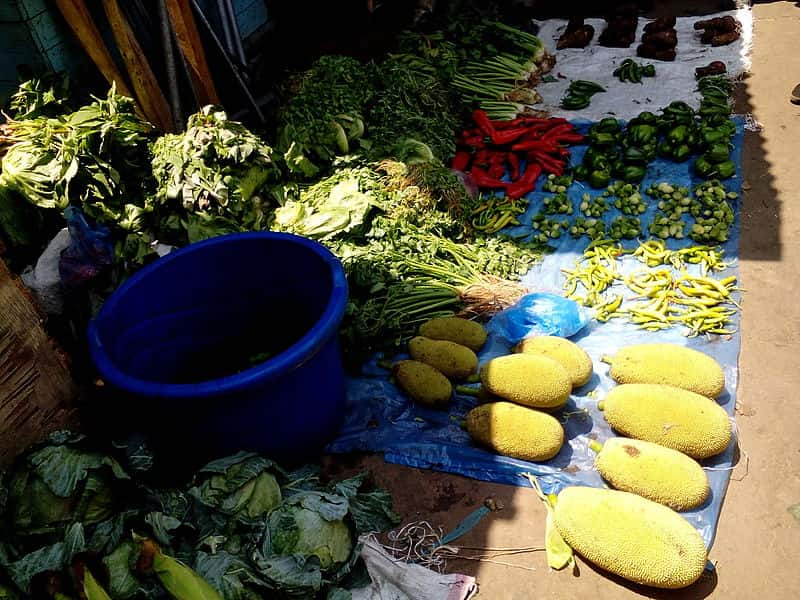Africa is famous for its richness in natural resources and biodiversity. In fact, Africa is home to 40% of the world’s gold and has the largest reserves of cobalt, uranium, platinum, and diamond. It also holds 65% of the world’s arable land.
It’s no surprise the continent has about 40,000 species of African vegetables. These vegetables have been used as a diet in African communities to bridge the food security gap. It has also been used as a source of nutrients and for healing purposes by traditional healers. For example, the roots of a vegetable would be boiled and used as medicine.
Become an insider. Subscribe to our newsletter for more top trending stories like this!
Uganda is an African country that invests in African vegetables with medicinal value.
Farming of African Medicinal vegetables in Uganda. Source: Hindawi.com
The medicinal value of traditional African vegetables has recently caught the attention of scientists and researchers. Most of these vegetables contain high levels of phytochemicals. These are chemical compounds with antioxidant properties that help reduce the chances of chronic illness, age-related conditions, and non-communicable diseases.
Today’s piece highlights five incredible African vegetables with these and other medicinal values.
1. Fluted Pumpkin
Top of our list of African vegetables with medicinal value is the Fluted Pumpkin. Its scientific name is Telfairia occidentalis. This vegetable mainly grows in West Africa, especially Nigeria. It has different names in the various states of Nigeria. For example, it’s known as eweroko in the Yoruba language, ugu in Igbo, Ikong-ubong in Ibibio, and Offi in the Ukwani language.
In Ghana, the fluted pumpkin’s name is Krobonko, while in Sierra Leone, it’s Gonugbe or pondokoko.
This vegetable is mostly cultivated due to the nutritional value derived from its leaves. A fluted pumpkin’s leaves are rich in minerals like Iron, Phosphorus, and Zinc.
You can use fluted pumpkin to help boost blood production and treat diseases like Anemia due to its high level of Iron. Its Phosphorus content can help alleviate hypertension, while zinc contributes to the antioxidant properties of leafy greens.
Although eweroko can be served in many dishes, it’s mostly used in soups or stews.
People Also Read: Peanut Nutrition Facts: 6 Surprising Facts You Need to Know
2. Moringa Oleifera
Moringa powder is currently a household name in the urban set-up. The powder is derived from Moringa Oleifera, an African leafy vegetable. It’s also known as the horseradish, miracle, or drumstick tree. You can use its leaves in powdered form, raw or cooked.
Like vitamin C, this plant has long been enjoyed for its nutritional value. The leaves of the Miracle tree contain bioactive compounds like antioxidants that help mitigate diseases like diabetes, hypertension, liver problems, infections, high cholesterol, and stress. The medicinal properties of this traditional African vegetable are still being reviewed.
Get this book on African vegetables with medicinal value on Amazon.
3. Bitter Leaf
Bitter leaf is one of the top medicinal vegetables in Africa you should consider adding to your diet. Its scientific name is Vernonia amygdalina, a naturally occurring shrub. It grows along drainage lines, forest margins, woodlands, and open grassland. The bitter leaf is common in tropical Africa and Asia.
Become an insider. Subscribe to our newsletter for more top trending stories like this!
Traditionally, the bitter leaf was used to treat parasites in chimpanzees in Tanzania. These uses triggered a series of research to find other medicinal use of the vegetable. It was discovered that the entire plant can be used as a laxative, anti-malaria, and anthelmintic. Extracts of the leaves can be used as an appetizer, a digestive tonic, and to treat wounds.
The extract from decanting the leaves is used to treat Malaria in Ghana and Guinea, while in Malawi and Uganda, the leaves help the placenta expand, control bleeding, lessen post-partum uterine contraction, and induce lactation.
People Also Read: 11 Incredible Black Doctors Who Made History
4. Ocimum
Ocimum is from a family plant known as Lamiaceae. This traditional African vegetable has over 50 species, including Ocimum gratissimum and Ocimum basilicum. Some of its local names include dai-doya ta gida in Hausa, Efirin in Yoruba, or neh-awu in Ibo language.
The leaves of Ocimum have an aroma due to their volatile oil content. The volatile oil has up to 75% thymol, meaning the vegetable has antimicrobial properties. Based on the oil content, Ocimum gratissimum is used to treat diarrhea. This species also manages fever, pneumonia, headache, respiratory infections, conjunctivitis, and skin diseases.
Ocimum basilicum (basil) has traditionally been used to treat worms, warts, constipation, diarrhea, headaches, and cough. It was also believed to be a veterinary medicinal plant used to repel mosquitoes and kill fleas.
Today you can boil the basil leaves and inhale the vapor to help clear colds or nasal problems. You can also rub the leaves on your hands and sniff them. Alternatively, Oscium can be enjoyed in soups, sauces, salads, or even pizza. Add it at the end of cooking and avoid crashing the leaves to maintain their aroma.
5. Green Amaranth
Our list of African vegetables with medicinal value isn’t complete without the Green Amaranth, also called Morogo or Green Tete. Its scientific name is Amaranthus hybridus, a traditional dish in South Africa.
This nutritious vegetable grows in the wild but can also be cultivated. It’s fit for human and animal consumption.
Morogo contains Zinc content used for fertility treatment and managing diabetes.
Vegetables of African heritage have been ignored and underutilized for a while. One of the probable reasons is the view that traditional African vegetables are food for the poor, wild shrubs or need to be more urban for consumption. As more scientists gain interest in these vegetables, the narrative will change. Incorporate African vegetables into your diet and enjoy their medicinal benefits.
Nearly 80% of consumers visit directories with reviews to find a local business. List your business for free in our exclusive Spotcovery Black-Owned Business Directory.
Spotcovery offers unique and fresh daily content on Black culture, lifestyle, and experiences. We talk about everything black, black people, black-owned and black-owned businesses. We also deliver authentic and relevant content that will inform, inspire and empower you! The future of black media is critical to today’s black experience! Our primary audience includes African American, African, Afro-Caribbean, and people of African heritage. Black culture is for the culture!
Become an insider. Subscribe to our newsletter for more top trending stories like this!





